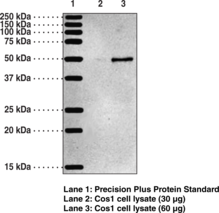Description
p23 is a highly conserved ubiquitous protein, known to have an important function as a co-chaperone for the Hsp90 chaperoning system.{16041} Studies have revealed that p23 is a small protein (18-25 kDa) with a simple structure.{16042,13980} p23 does not have any structural homology with any other known proteins.{16041} p23 was first discovered as a part of the Hsp90-progesterone receptor complex along with Hsp70, p54, and p50.{16041} p23 is a phospho-protein, which is highly acidic and has an aspartic acid-rich C-terminal domain.{16041} Numerous studies have found p23 to be associated with other client proteins like Fes tyrosine kinase{16043}, the heme-regulated kinase HRI{16044}, Hsf1 transcription factor{16043}, aryl hydrocarbon receptor{16043}, telomerase{16045}, and Hepadnavirus reverse transcriptase.{16046} In spite of several years of study, the exact functional significance of p23 is still not clear.p23 is identical to cytosolic prostaglandin E synthase (cPGES), coverting to PGH2 to PGE2 downstream of COX-1.{8691} p23 is also thought to be involved in the adenosine triphosphate-mediated Hsp90 binding of client proteins.{16047} Since many Hsp90 client proteins are involved in oncogenic survival signaling, a recent study has concluded p23 to be a promising target in leukemic apoptosis.{16048} Hsp90 and its co-chaperone p23 are certainly among the emerging anti-tumor targets in oncology.
Synonyms: cPGE Synthase|cPGES|Hsp90 Co-chaperone|p23|Telomerate-binding protein p23
Immunogen: Recombinant human full length p23 protein
Formulation: protein G affinity-purified mouse IgG at a concentration of 1 mg/ml in PBS, pH 7.2, containing 0.09% sodium azide and 50% glycerol
Isotype: IgG1
Applications: WB,IP, and ELISA
Origin: Animal/Mouse
Stability: 365 days
Application|ELISA||Application|Immunoprecipitation||Application|Western Blot||Product Type|Antibodies|Monoclonal Antibodies||Research Area|Cancer|Cell Death|Apoptosis||Research Area|Lipid Biochemistry|Cyclooxygenase Pathway

